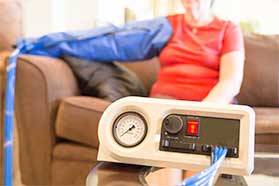Lymphedema Treatment in Newfields, NH
What Is Lymphedema?

Your lymphatic system's job is to circulate its protein-rich lymphatic fluid, scavenging waste products, bacteria, viruses, and harmful substances, and carrying them to your lymph nodes where they are filtered and flushed out of your body. Sometimes however, this system does not work properly.
Lymphedema, also referred to as lymphatic obstruction, is a condition in which an abnormal amount of high-protein lymphatic fluid collects just beneath the skin and causes swelling, or edema . Lymphedema usually occurs in the arms or legs, and less commonly in the trunk, head, neck, breasts, or genitals.
Lymphedema causes an inflammatory reaction in the affected area, which leads to the formation of a type of scar tissue called fibrosis. The development of fibrosis further complicates the drainage of excess fluid, because when lymphatic fluid collects in a specific area, it tends to attract even more fluid. The combination of increasing fluid and fibrosis can inhibit proper blood flow and prevent oxygen and nutrients from reaching the area, resulting in delayed wound healing and increased risk of infection.
Diagnosing and treating lymphedema early can prevent more serious ramifications of the condition. Request more information about lymphedema treatment today. Call (207) 536-9661 or contact Vibrant Health Naturopathic Medical Center online.
Lymphedema Causes
There are two types of lymphedema, primary lymphedema and secondary lymphedema.
Primary lymphedema, also known as hereditary lymphedema, causes abnormalities in the lymphatic system at birth. Secondary lymphedema is the more common form of lymphedema which occurs when lymph vessels or lymph nodes are damaged, blocked or removed due to cancer, cancer treatments like radiation or surgery, infection, or even parasites.
Other risk factors linked to the development of lymphedema include aging, obesity, and certain forms of arthritis.
Lymphedema Symptoms & Diagnosis
Lymphedema symptoms are typically isolated to the affected limb(s) and include:
- Fluid buildup and swelling
- Heavy or full sensation
- Limited range of motion
- Tightness of the skin or the tissue beneath the skin
- Aching or discomfort
- Development of scar tissue which manifests as a hardening or thickening of the tissue below the skin (fibrosis)
- Diminished flexibility
- Delayed wound healing
- Recurrent infections
Detection and treatment in the early stages can improve the prognosis of the condition, though sometimes, lymphedema sufferers do not develop symptoms at all in the early stages. Your medical history, together with a physical examination and a review of your symptoms is usually sufficient for a lymphedema diagnosis, but diagnostic tests like an MRI, CT scan, ultrasound or a radionuclide imaging of your lymphatic system (lymphoscintigraphy) may be necessary.
Upon receiving a diagnosis, your lymphedema will be classified in one of four stages, based on its severity:
- Stage 0 - Non-visible, latency with heaviness
- Stage 1 - Spontaneously reversible with pitting
- Stage 2 - Spontaneously irreversible with obvious swelling and fibrosis
- Stage 3 - Lymphostatic elephantiasis with extreme swelling
Severe complications can occur with untreated lymphedema including infection, delayed wound healing, even sepsis and gangrene.
Managing Lymphedema
There is no cure for lymphedema; however, the condition and its symptoms are manageable with consistent treatment. Most commonly, treatment involves reducing the condition's characteristic swelling and managing lymphedema pain. If you can catch lymphedema early, the prognosis is better.
The most common lymphedema treatments include:
Compression
There are several types of compression therapy, including:
- Wrapping/Bandaging - A wrap or bandage that is wrapped tightest around your fingers or toes then progressively loosens as it approaches your trunk can facilitate the flow of lymph fluid back toward the trunk of our body.
- Compression using arm sleeves or leg stockings - Designed to provide constant compression to your limbs, these garments encourage the flow of lymph fluid out of your limbs. They can be worn while exercising for maximum effect. These garments should be properly fitted by a healthcare professional or lymphedema therapist and may have to be custom-made.
- Pneumatic compression - A special inflatable sleeve attached to a pump can be used for compression with you have lymphedema in a limb. As the pump inflates the sleeve, lymph fluid is moved out of your fingers or toes and then the rest of the limb, back toward the torso.
Lymphedema Massage
Manual lymph draining is a lymphedema massage technique designed to restore the flow of lymph fluid out of the area where it has collected. You should only use a massage therapist or healthcare practitioner who has been trained in this technique. Lymphedema patients who have or are prone to developing blood clots should avoid massage, as should individuals with acute infection.
Lymphedema Exercise Regimen
Regular light exercises which moves your affected limb(s) can help to facilitate drainage of lymph fluid and reduce swelling. Your healthcare provider will teach you lymphedema exercises as well as how to properly bandage your limb before exercising to keep you safe.
Lymphedema Diet
Depending on co-morbidities and the cause of your lymphedema, there are certain dietary changes that may help improve your condition. Obesity increases your lymphedema risk and can make treatment more difficult. A specially-trained dietician experienced in managing lymphedema can help you design an ideal diet which brings you to a healthy weight.
Complete Decongestive Therapy
Complete decongestive therapy (CDT) combines therapies, such as light exercise, lymphatic draining, bandaging, and skincare. CDT is not a good option for people with certain medical conditions like infections or blood clotting disorders.
Surgery
In extreme lymphedema cases, it may be necessary to remove tissue and excess fluid surgically to reduce swelling.
With any form of lymphedema treatment, it is important to consult with a healthcare provider who is experienced in treating lymphedema. Depending on the severity of your lymphedema, co-morbidities and your overall health, lymphedema may require hospitalization, but it can usually be treated at home or in special lymphedema clinics by trained healthcare professionals.
If you are experiencing what you believe may be lymphedema, schedule a consultation with a qualified healthcare practitioner in Newfields who specializes in treating the condition, as well as techniques to reduce your risk of lymphedema. Call (207) 536-9661 or contact Vibrant Health Naturopathic Medical Center online.
Vibrant Health Naturopathic Medical Center
Address
3 Riverside DriveGreenland, NH 03840
(207) 536-9661
www.vibranthealthnaturalmedicine.com
Hours
Mon:
8:30 am - 5:00 pm
Tue:
9:00 am - 5:00 pm
Wed:
10:30 am - 5:00 pm
Thu:
9:00 am - 5:00 pm
Fri:
10:00 am - 4:00 pm
Sat:
Closed
Sun:
Closed

